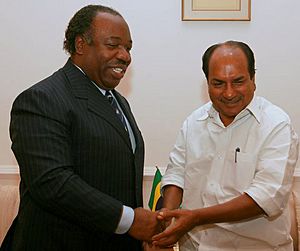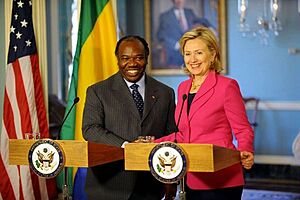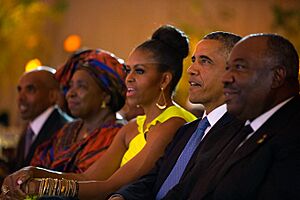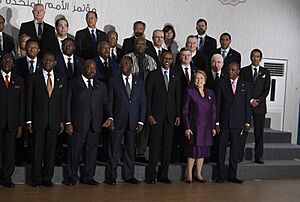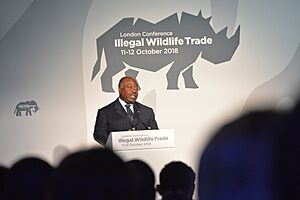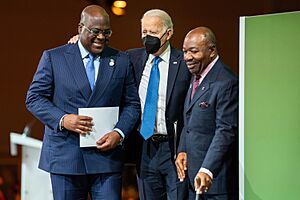Ali Bongo facts for kids
Quick facts for kids
Ali Bongo
|
|
|---|---|
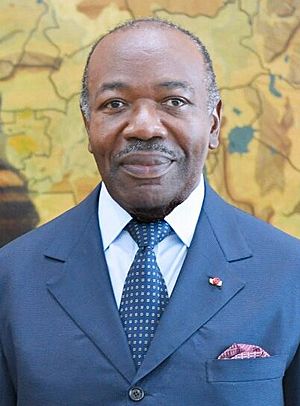
Bongo in 2022
|
|
| 3rd President of Gabon | |
| In office 16 October 2009 – 30 August 2023 |
|
| Prime Minister |
See list
Paul Biyoghé Mba
Raymond Ndong Sima Daniel Ona Ondo Emmanuel Issoze-Ngondet Julien Nkoghe Bekale Rose Christiane Raponda Alain Claude Bilie By Nze |
| Vice President |
See list
Vacant
(2009–2017; 2019–2023) Pierre Claver Maganga Moussavou (2017–2019) Rose Christiane Raponda (Jan–Aug 2023) |
| Preceded by | Omar Bongo Rose Francine Rogombé (acting) |
| Succeeded by | Brice Oligui Nguema |
| Minister of National Defense | |
| In office 25 January 1999 – 15 August 2009 |
|
| Prime Minister | Jean-François Ntoutoume Emane Jean Eyeghé Ndong Paul Biyoghé Mba |
| Preceded by | Idriss Ngari |
| Succeeded by | Angélique Ngoma |
| Deputy of the National Assembly of Gabon | |
| In office 1990–2009 |
|
| Constituency | Haut-Ogooué Province |
| Minister for Foreign Affairs | |
| In office 1989–1991 |
|
| Prime Minister | Léon Mébiame Casimir Oyé-Mba |
| Preceded by | Martin Bongo |
| Succeeded by | Pascaline Bongo Ondimba |
| Personal details | |
| Born |
Alain-Bernard Bongo
9 February 1959 Brazzaville, then part of French Equatorial Africa |
| Political party | PDG |
| Spouse | Sylvia Valentin |
| Children | 3, including Noureddin |
| Alma mater | Pantheon-Sorbonne University |
Ali Bongo Ondimba (born Alain-Bernard Bongo; 9 February 1959) is a Gabonese former politician. He served as the third president of Gabon from 2009 until August 2023. He was removed from office by the military in what is known as a coup.
Ali Bongo is a member of the Gabonese Democratic Party. He is the son of Omar Bongo, who was president of Gabon from 1967 until he passed away in 2009.
During his father's time as president, Ali Bongo held several important roles. He was the Minister of Foreign Affairs from 1989 to 1991. He also represented Bongoville as a deputy in the National Assembly from 1991 to 1999. Later, he became the Minister of National Defense from 1999 to 2009.
After his father's death, Ali Bongo was elected president in the 2009 election. This marked the first time a father and son had both been president in Gabon. He was re-elected in 2016.
On August 30, 2023, after the results of the general election, the military took control. They were led by Bongo's cousin, Brice Oligui Nguema. The military removed Ali Bongo from the presidency. They said there was a lack of fairness in the election. This event ended the 56-year rule of the Bongo family in Gabon. Ali Bongo was briefly held, then later released.
Contents
Early Life and Career
Birth and Name Change
Ali Bongo was born Alain-Bernard Bongo in Brazzaville. His parents were Albert-Bernard Bongo (who later became Omar Bongo Ondimba) and Josephine Kama (who later became Patience Dabany).
In 1973, Alain-Bernard changed his name to Ali when he and his father converted to Islam. In 2003, they both added "Ondimba" to their names. This was a family name from Omar's father, Basile Ondimba.
Education and Music
Ali Bongo went to a private school in Neuilly-sur-Seine, France. He then studied law at the Sorbonne. In 2018, he received an honorary law degree from Wuhan University in China.
In 1977, under the name Alain Bongo, he released a funk music album called A Brand New Man.
Starting in Politics
After finishing his law studies, Ali Bongo began his political career. He joined the Gabonese Democratic Party (PDG) in 1981. He was elected to the party's Central Committee in 1983. He then became his father's personal representative to the PDG in 1984.
From 1987 to 1989, Bongo served as the President's High Personal Representative. In 1989, his father appointed him as Minister of Foreign Affairs and Cooperation. He held this role for two years.
In the 1990 parliamentary election, he was elected to the National Assembly. This was the first election after Gabon allowed multiple political parties. A new rule in 1991 said ministers had to be at least 35 years old. Because of this, he left the government.
After leaving the government, Bongo took his seat as a Deputy in the National Assembly in 1991. In February 1992, he helped arrange a visit by American pop singer Michael Jackson to Gabon.
In 1996, Bongo became the President of the Higher Council of Islamic Affairs of Gabon. He was re-elected to his parliamentary seat in the December 1996 election. On January 25, 1999, he was appointed Minister of National Defense.
He was re-elected to the National Assembly in the December 2001 election. In July 2003, he was elected as a vice-president of the PDG party. During the 2005 presidential election, he helped with his father's re-election campaign. After that election, he became a Minister of State on January 21, 2006, while still being the defense minister.
Bongo was re-elected to the National Assembly in the December 2006 election. He kept his role as Minister of State for National Defense. In September 2008, he was re-elected as a vice-president of the PDG.
Election and Presidency
Omar Bongo passed away on June 8, 2009. Ali Bongo spoke on television that night, asking everyone to remain calm and united. Many people thought he would become his father's successor.
Ali Bongo was one of ten people who wanted to be the PDG party's candidate for the presidential election. The election was set for August 30, 2009. On July 16, the party leadership chose Bongo as their candidate. This decision was confirmed at a party meeting on July 19. He thanked the delegates and promised to fight corruption and share the country's wealth.
Even though he was running for president, Bongo remained Minister of Defense in the government until August 15, 2009.
A few days after the election on August 30, 2009, it was announced that Ali Bongo had won with 42% of the votes. The Constitutional Court of Gabon confirmed this result. Some people protested the results, especially in Gabon's second-largest city, Port-Gentil. The Constitutional Court checked the votes again and confirmed Bongo as the winner with 41.79% on October 12, 2009.
He was sworn in as president on October 16. Many African presidents attended the ceremony. Bongo promised to work for justice and fight corruption. He also said that quick action was needed to build trust and hope. He announced that Paul Biyoghe Mba would continue as Prime Minister.
The new government was announced on October 17. It had fewer ministers, which was one of Bongo's promises to save money. Most of the ministers were new to their roles.
On June 9, 2011, Ali Bongo met with Barack Obama at the White House.
In 2012, there were clashes between supporters of opposition figure André Mba Obame and the police in Libreville.
On August 17, 2015, Bongo announced that he would donate everything he inherited from his father to the young people of Gabon. This would be done through a foundation for youth and education. He explained that "we are all heirs of Omar Bongo Ondimba" and that "no Gabonese must be left behind."
Gabon's economy relies heavily on producing and exporting natural resources. However, the country still faces challenges. In 2016, about 30% of the working population was unemployed. There were also frequent arrests during student or union protests. Access to healthcare was difficult, and public services often failed. More than half of the population lived below the poverty line.
On October 24, 2018, Bongo was hospitalized in Riyadh for an illness. He was later moved to a military hospital in Rabat on November 29, 2018, to continue his recovery. On December 9, 2018, Gabon's Vice President Pierre Claver Maganga Moussavou reported that Bongo had a stroke. He then recovered at a private home in Rabat.
From October 24, 2018, to January 1, 2019, Bongo was not seen in public. This led to many rumors about his health. On January 1, 2019, Bongo gave his first public speech in a video. This helped to stop rumors about his death. However, some activists questioned if the person in the video was truly Bongo. In August 2019, Bongo made his first public appearance since his stroke. He has used a wheelchair in public several times since then.
On January 7, 2019, soldiers in Gabon attempted a coup. The attempt failed, and the government regained control.
In early 2020, the Senate and National Assembly passed a constitutional change. This change would allow the president to appoint one-third of senators instead of having them elected.
In October 2021, Bongo was mentioned in the Pandora Papers leak. This leak showed that he controlled two companies in the British Virgin Islands.
2023 Election and Overthrow
In January 2018, Gabon's parliament voted to use a two-round electoral system for elections. This would replace the old single-round system. However, this was changed back in April 2023, just before the general elections. Other changes included five-year terms for all elected officials and no limits on re-election.
About a month before the elections on August 26, the Gabonese Center for Elections made a last-minute change. Voters had to choose a parliamentary candidate from the same party as their preferred presidential candidate. The main opposition candidate, Albert Ondo Ossa, was independent. This made it hard for voters to support him and a parliamentary candidate from the opposition group.
Foreign news and independent observers were reportedly not allowed into Gabon on election day. There were delays at many polling stations. After voting, the government restricted internet access and French news broadcasts. A curfew was also put in place.
Just two hours before polls closed, Ondo Ossa claimed there was "fraud" by Bongo's side. He had already said he won and asked Bongo to allow a peaceful transfer of power. The official election results were announced late at night on state television without warning. The country was under curfew, and the internet was cut off to prevent "false news" and possible violence.
In the early morning of August 30, Bongo's re-election was announced. He had 64.27% of the vote. Minutes later, the military took over the Presidential Palace in Libreville. About a dozen military members announced the end of Bongo's rule. A military spokesperson said they were acting on behalf of a "Committee for the Transition and Restoration of Institutions". They said Bongo's "irresponsible governance" was causing problems and risking chaos. They also canceled the recent election, dissolved government bodies, and closed the country's borders.
The military group later announced that Bongo and his eldest son, Noureddin Bongo Valentin, were arrested and held at home. Several of Bongo's presidential aides were also arrested. The military said they faced charges like treason and corruption. Despite being held, Bongo released a video asking for help from his friends and supporters.
Brice Oligui Nguema, Bongo's cousin and commander of the Republican Guard, was later made interim president by the military. A week after the coup, Oligui allowed Bongo to be released for medical reasons. He was free to leave the country for treatment. After his release, Bongo moved to his private home in Libreville.
In September 2024, Bongo announced he was retiring from politics. He also asked for his wife Sylvia and son Noureddin to be released. He accepted responsibility for "failings" during his time in office. In May 2025, Bongo and his family moved to Angola. This happened after an agreement between President João Lourenço and Oligui, who had since been elected president of Gabon.
In January 2025, the PDG party chose Blaise Louembe as its new leader. The party supported Oligui in the 2025 Gabonese presidential election. However, some party leaders disagreed. This led to a new group forming under Ali Akbar Onanga Y’Obégué, who Bongo named as the party's true leader.
Family Life
Ali Bongo married his first wife, Sylvia Valentin, in 1989. She is French-born. In 1994, Ali Bongo married his second wife, American Inge Lynn Collins Bongo. She filed for divorce in 2015.
He has four children: one daughter, Malika Bongo Ondimba, and three sons, Noureddin Bongo Valentin, Jalil Bongo Ondimba, and Bilal Bongo. He and Sylvia adopted Bilal in 2002.
See also
 In Spanish: Ali Bongo para niños
In Spanish: Ali Bongo para niños
 | Tommie Smith |
 | Simone Manuel |
 | Shani Davis |
 | Simone Biles |
 | Alice Coachman |


